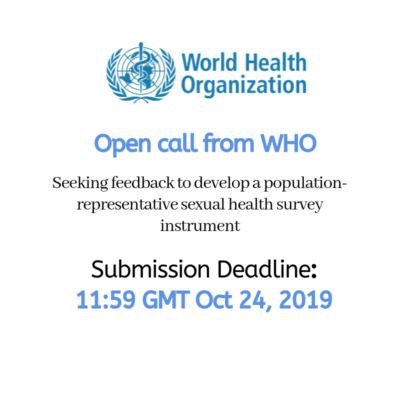Open call from WHO: Seeking feedback to develop a population-representative sexual health survey instrument

- This event has passed.
Open call from WHO: Seeking feedback to develop a population-representative sexual health survey instrument
October 14, 2019 @ 8:00 am - October 24, 2019 @ 11:59 pm

Are you a sexual/reproductive health researcher or advocate? Passionate about sexual health in practice or research? The WHO and partners need your feedback on a survey instrument assessing sexual practices, behaviours, and outcomes worldwide.
Background
To date, there is no standard, globally-agreed upon instrument to measure sexual practices, behaviours and sexual health-related outcomes. Instead, many population-representative surveys use their own items and domains, making comparisons and collaboration difficult. To encourage the inclusion of transparent and comparable sexual health-related measures on population-representative surveys, and in response to calls from leading sexual health researchers, the WHO seeks to develop a standard instrument for assessing sexual practices, behaviours, and sexual health-related outcomes worldwide. This instrument could then serve as a ‘module’ for use in national and sub-national data collection, as well as allow for needed comparative research.
The purpose of this open call is to solicit examples of existing survey instruments, domains related to sexual health, implementation considerations, and creative ideas for related measures or analyses. People with high-scoring submissions will be supported to join an in-person hackathon (72-hour event with expert faculty) to finalize a standardized sexual health survey instrument in January 2020.
Who can participate?
This call is open to anyone with professional interest, experience and/or expertise in sexual practices/behaviours and sexual health-related outcomes. This experience can be related to certain populations or the general population.
Why should I submit?
Your submission will help to develop this standard instrument for assessing sexual health practices, behaviours, and outcomes, and also encourage transparent and comparable sexual health items on population-representative surveys across the globe.
People providing eligible submissions will be given a commendation certificate from the UNDP/UNFPA/UNICEF/WHO/World Bank Special Programme of Research, Development and Research Training in Human Reproduction (HRP) to recognise participation. A selected group of 10-20 people whose overall contributions receive the highest scores from judges will be invited to join the hackathon. People who submit any idea or measure(s) that is used in the final standardized instrument will be recognized in the publication as an instrument co-developer.
For more information, and submission format and guideline, visit this page.
Submissions will be accepted in all six official UN languages (Arabic, Chinese, English, French, Russian and Spanish).
